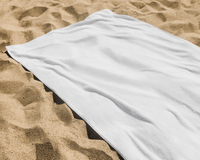Is there anything better than snuggling in a soft, fluffy, and clean towel at the end of a long day? It is important to take care of your towels properly so that you can enjoy them. Washing towels seems to be an easy task. However, you should learn how to wash towels correctly, whether using a washing machine or doing it by hand.
Washing, drying, and storing towels properly will keep them softer and last longer. Here are some useful tips for keeping towels in your home clean and fluffy for a long time.
What You'll Need to Clean Towels with the Right Way
Normally, we can use a bath towel three to four times before we need to throw it in the washer. It is recommended to replace hand towels every two days. Despite being invisible, a towel can have yeast, mold, and Escherichia coli on it.
To clean your towels properly, you need:
- Detergent
- Baking soda
- Wool laundry balls
- Fabric softener or white vinegar
- Essential oils (optional)

How to Wash Towels?
Knowing how to clean towels properly will ensure they last for as long as possible and keep their smooth, silky texture. However, there are some things to keep in mind when washing towels, even if they seem as simple as dumping them in the washing machine.
How to Wash Towels in a Washing Machine?
To begin with, dirty towels should never be washed with your laundry. The towels will not get as clean and fresh in the washing machine if other dirty items are in the machine as well. Furthermore, smaller pieces may damage delicate fibers. Instead, separate your towels into white and colorful towels, then wash them separately. Combined washing will eventually cause subtle discoloration.
Which Detergent to Use to Wash Towels?
- There is no need to change detergents when it comes to washing towels, so you can use whatever you like.
- When using laundry detergent, it's a good idea to use about half the recommended amount. They can become stiff if you use too much laundry detergent when washing towels.
- You can soften towels using fabric softener, but be sure to use it only once every third or fourth wash. Otherwise, the buildup may occur. Alternatively, you can use 1/4 cup of white vinegar while washing towels.
- When your towels get stained, bleach can help you remove them while washing towels. Depending on the color of the towel, you may need to use chlorine bleach or non-chlorine bleach (color-safe bleach).
- To avoid fading dark-colored towels and leaving white bleach spots on your luxury towels when washing colored towels, use only color-safe bleach.

Which Temperature to Use to Wash Towels?
Washing white towels in hot water is a must. In order for white towels to retain their brightness, they should be washed in hot water. On the other hand, warm water is best for washing colorful towels.
Which Cycle to Use to Wash Towels?
Using the regular wash cycle in your washing machine is sufficient to sterilize your towels. Compared with gentle cycles, these cycles are best for washing towels because they spin faster and wash longer, which helps loosen dirt and bacteria from the towel fibers.
How to Wash Towels in Hand?
You can easily wash towels by hand. If you have a bathtub or a sink large enough for them, you can wash the towels. Add detergent to a bathtub full of hot water before washing towels by hand.
Stir the towels in the water for an hour, then allow them to soak. Once the water has been drained, rinse the items with fresh water. You can air-dry them or put them in a dryer after you wring out as much water as possible.
How to Dry Towels?
- Once they have been washed, place them into the dryer with wool balls added to dry towels. The wool balls are useful for fluffing towels and speeding up their drying time.
- You can choose to air-dry your towels or use a dryer. Using the standard or automatic cycle on your dryer will ensure maximum fluffy results and prevent fiber damage. To minimize wrinkles, remove towels from the dryer as soon as possible to minimize wrinkles and fold them immediately.
- Even a slight bit of moisture can cause a musty smell in towels, so make sure they're completely dry before removing them from the dryer.
- Towels can be hung outside or put on a drying rack for air drying. The towels may appear stiff after air drying, but a few fluffs in the dryer on 'no heat' will soften them up.

Tips for Cleaning Towel?
If you want them to remain fluffy, clean, and durable, you should keep some tips in mind when washing your towels.
How Often Should I Wash Towels?
Your bath towel will stay germ-free longer if you let it dry completely between uses and wash it frequently. According to the Cleaning Institute, bath towels should be washed every three uses. Towels can be cleaned, and germs can be removed with a regular laundry cycle.
Does Your Washing Need to Be More Frequent?
The more often you wash your towels, the less likely they will grow unwanted bacteria and fungi. Even if you have a regular washing cycle, it might be necessary to wash your bath towels more frequently under some circumstances:
- The towel should be washed after being soiled with body fluid.
- The towels you use for the gym should be washed after one use if they absorb sweat or remain moist for a while in your gym bag.
- In bathrooms that tend to be damp and don't dry fully, towels should be washed after each use.
- Keep all of your towels clean after using them if you suffer from eczema or sensitive skin.

What is the Best Way to Store Towels?
When it comes to the bathroom, towels are essential. However, storage can be challenging, especially if your space is limited. The towel storage options in your bathroom are many.
Towels can be stored on various shelves and cabinets in the bathroom. Using items that aren't necessarily designed for the bathroom can sometimes be the most helpful when it comes to keeping towels organized and clean.
These clever storage tips will help you make the most of your limited amount of space if you don't have a linen closet nearby.
- For small bathrooms, a brass towel rail makes a great option for storing towels.
- Baskets can fit almost anywhere, including the bathroom. For example, you can place folded towels under the sink or by the tub in a square basket or roll them up and place them in a round wicker basket.
- For an organized bathroom, you can hang a towel rack on your door.
- Another option is to mount a vertical storage shelf if you don't have much room. Despite not being designed specifically for the bathroom, wall spine shelves work well for folded or rolled towels.
- The circular shape of towel rings is particularly helpful for storing hand and face towels - you can let them dry between uses by spreading them out.
- Depending on how much space you have, even your bathroom door can be used as a wine rack.
- Cabinets or credenzas originally designed for the kitchen or bedroom are often suitable for bathrooms. Your cabinet can be used for hand towels and washcloths instead of large bath towels if you have a too limited amount of storage space.
- In addition to being a natural antibacterial, olive wood bowls look incredibly beautiful with white towels rolled inside them.
How to Wash New Towels?
The fibers will be more open if you wash towels before using them. Unless the fibers are open, they won't absorb as well. Another method for opening up the fibers is to soak them in cold water for 24 hours and then wash them as directed. During this process, any remnants of excess color will be removed.
To make new towels feel plush and soft, fabric softeners are often added to them, but these softeners prevent them from absorbing liquids. You can wash away that residue by adding half a cup of white vinegar to the rinse cycle during the initial wash cycle. Furthermore, vinegar binds the color to cotton, so when you wash towels with vinegar, towels keep their colors better.
To keep bath towels as absorbent as possible, avoid washing and drying them with fabric softeners or dryer sheets.
Why are My Towels Hard After Washing?
You may find that your soft, snuggly bath towels become stiff after washing. Towels' once fluffy fibers can become scratchy and rough due to several factors.
- First, stiff fabrics may result from water that has a high mineral content naturally.
- The use of fabric softeners can also result in hard towels. A commercial fabric softener functions by coating the filaments, thereby plumping them and reducing static electricity. However, fabric softeners can accumulate chemicals over time, reducing absorbency and making items such as towels and washcloths scratchy and rough.
- When it comes to drying the laundry, hanging it out in the open air is a budget-friendly, green alternative to the dryer. Line-dried clothes can, however, feel abrasive and harsh compared to an automatic dryer, which has a softening effect on towels.
- Towels and linen become worn over time, just like all items that are used regularly. Frequently washing fabrics in harsh detergents, bathing in hot water, and drying them in dryers can cause them to lose their flexibility and bounce.
Do You Wash Towels with Hot or Cold Water?
The best way to wash white towels is with hot water, while colored towels should be washed with warm water.
Can You Wash Towels with Clothes?
Always wash bath towels separately from your clothes. Washing towels in the washing machine with clothes can spread germs and bacteria between them. Furthermore, damp towels dry slower than most clothes, so drying them in the same load is easier.
Conclusion
It will be much easier for you to maintain them softly over time if you know how to wash your towels. You can continue to boost your mood by snuggling up in a fluffy towel even after months you buy it. Don't forget to use the information we have compiled for you.




